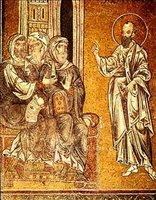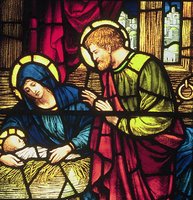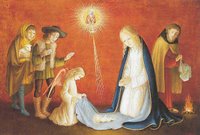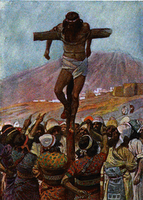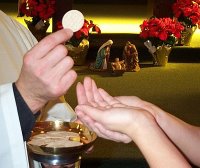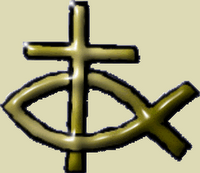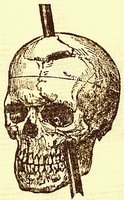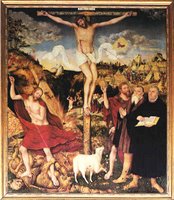I’ve made my list and checked it twice. That still doesn’t mean that there aren’t errors in this latest incarnation of the
Lutheran Carnival of Blogs. Be that as it may, I think you’ll enjoy the diverse content and writing styles exhibited in Lutheran Carnival XXXIX. As a bonus, I’ve discovered a new blogger to swell my reading list. You’ll see in a moment that I’ve divided the carnival into three sections. The first is dedicated to Advent and Christmas posts, the second covers other matters theological, and the third is for matters vocational, practical, and artistic.
Before that, I’ll take time to make the carnival’s customary introduction of a Lutheran personage. While she’s hardly unknown, I thought that since this coming Wednesday marks the
commemoration of her heavenly birthday, we could spend a moment remembering Katharina von Bora Luther.

Her parents placed Katharina von Bora (b.1499) in a convent when she was still a child. In 1515, she became a nun. Later, she and some of her associates heard the Gospel message being proclaimed in the Lutheran Reformation’s early years.
In April 1523 she and eight other nuns who desired to renounce Roman Catholicism were rescued from the convent and smuggled away to Wittenberg in empty herring barrels. Probably after airing them out for a while, Martin Luther and his associates helped some of these women return to their former homes while placing others with good families.
Luther and friends found that dealing with “Katy” was no easy task. She refused undesirable potential husbands, finally declaring that she’d either marry Martin or Nikolaus von Amsdorf, and nobody else. While concerned that a violent death would soon part him from any bride, Martin gave in to the stubborn young woman and they were married on 13 June 1525. Their marriage was happy and blessed with six children. Katy skillfully managed the Luther household, which always seemed to grow because of his generous hospitality.
Martin and Katie certainly butted heads at times. Perhaps that’s why Luther sometimes called her
kette (chain). However, the reformer truly adored his bride, also naming her “my rib” and “my lord Katie.” The freedom and joy that Martin Luther experienced in his marriage also received testimony from his 1535
Commentary on Galatians, which he lovingly called, “My Katie von Bora.”
After Martin’s death in 1546, Katharina remained in Wittenberg. Sadly, she lived most of her remaining years in poverty. She died on 20 December 1552 in an accident while traveling with her children to Torgau in order to escape the plague. She remains a model of the godly wife, a beautiful expression of the “excellent wife” celebrated in
Proverbs 31:10-31.
And now, on with the show.
Advent and Christmas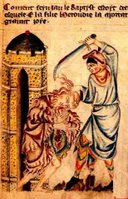
I just discovered the
Northwoods Seelsorger, who also happens to be a man I’ve known for a number of years. Now that he’s blogging, more people can experience Don Engebretson’s theological acumen and pastoral heart. Consider, for example,
John the Baptizer and the Christ He Was Looking For, wherein Pastor Engebretson entertains the idea that not long before John’s death, he may have been harboring doubts about the One whom he’d already declared to be the Lamb of God.
On Jordan’s Bank, an Advent sermon from the
Chaplain to the World shows how the hymns of the church relate the Gospel to us today, just as John the Baptist called people to repent and be baptized in Jesus’ time.
Dan takes a look at
A Couple of Spanish Christmas Carols that are part of a Christmas DVD published by the Wiggles. He says that while the song dedicated to Our Lady of Guadalupe doesn’t seem appropriate for Christmas,
Noche de Paz fits right in.
While planning a Youth lock-in during Advent,
Kelly ruminates on
Good Old St. Nick and talks about ways to approach the Santa Claus issue with children.

Pastor Klages, everyone’s favorite
Beggar At The Table, waxes eloquent
On Oranges. He first talks about the fruit given out and eaten so often at Christmas, then moves on to the theological council of the same name. Well, at least it’s
sort of Christmas related.
Higher Things assembled a number of their member bloggers’
posts for Advent. While I encourage you to venture forth and sample for yourself the varied offerings, I’ll first offer a teaser here in the Carnival.
Rev. Cwirla’s Blogosphere provides a succinct overview of
Advent. Meanwhile, in
I’ll Have a Blue Advent,
Madre looks at the significance of the colors for paraments, vestments, and wreaths. Also, one of the most mature young Lutheran writers going, Rachel Engebretson of
Here I Stand, offers the thoughtful contemplation
“Because He Will Save His People from Their Sin” — God with Us in Advent.
Several sermons are also linked from HT. Among these, Pastor Brent Kuhlman offers his manuscript for the First Sunday in Advent, based upon the day’s epistle in Year C of the Three Year Lectionary, reminding us that we are
Getting Ready for a King’s Visit. Bloghardt’s Reflector takes the traditional route with a sermon from the One Year Lectionary’s assigned Gospel, the Palm Sunday account from Saint Matthew. He continually reminds us that
Jesus Is Certainly Coming. Again, I recommend
HT’s entire Advent compilation.
Reaching way back into his childhood and returning with a “Cute Factor” of at least 9.5, Sean of
Hot Lutheran on Lutheran Action shows us
The Story of the Baby Jesus, his copiously illustrated Christmas book from 1989.
TheologicalProtestant or Lutheran? Der Bettler of
Hoc est verum says, “I used to be a Protestant,” and then describes the differences between Protestant and Lutheran thought.
Dan uses no more than the
Necessary Roughness in responding to a
Scouting post by
Father Hollywood with a discussion of his own Scouting experiences and the potential for unionism in
Religion and the Boy Scouts.
 House, M.Div
House, M.Div is certainly one busy new blogger. In
This Medicine is Not Px Approved, he makes the outrageous suggestion that Lutherans may still be right about the papacy and that the Bishop of Rome recently might have proved it. In
Gift, Schmift, House offers some mild criticism of the way a few modern Lutherans misuse the language of Gospel as gift. Along with the two he submitted, House gets an extra listing because two of his readers suggested the inclusion of
Becoming Alive. Here, the pseudonymous blogger reminds us not to worry about obtaining a personal relationship with Jesus since Christ has already established it for us.
Do we put
God in a Box, or does God do this to Himself? Pastor Chryst of
Preachrblog suggests that while sinful humanity may attempt to enclose and limit the Almighty, He already enclosed Himself in the Incarnation.
 Aardvark Alley
Aardvark Alley continues the hagiographies with solid information (plus notable pious myths and fables) surrounding several characters from Scripture and the Christian Church. While all of these biographies have their merits, he opted to submit the only recently published candidate who is numbered among the Eight Doctors of the Undivided Church,
Saint Ambrose of Milan. However, some preferred the biographies of
Saint Nicholas of Myra or
Saint Lucy of Syracuse ... so they’re here, too.
After a visit to a museum, Frank over at
Putting Out The Fire gives us his thoughts on the similarities between French Impressionism and the way we look at and plant churches in
Monet and Missions. Frank certainly has a knack for titling his writing. The two-part preceding posts, both pertaining to hymnody, are
Asparagus and Jelly Donuts and (naturally)
Asparagus and Jelly Donuts, Part 2.
Dan at
Random Intolerance sort of shows how to blog without really blogging. Beginning by saying,
I Have Three Posts, he then describes his three works in progress. He fills the gaps with a copy of an email asking for donations to file another lawsuit against the Synodical President of the LCMS and adds his own brief comments to the end.
The recently married Cantor descends from his
Padded Balcony to carefully examine the works and responsibilities of called ministers, the laity, and the Holy Spirit in making disciples as he answers his
Fan Mail.
Here’s my own contribution for this category:
Christian (dis-)Unity, examines fragmentation within Christendom and among the sectarians and cults at its fringes and beyond in light of Christ’s prayer for unity in
John 17 and God’s demands for doctrinal fidelity elsewhere in the Scriptures.
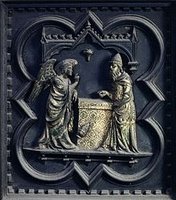 Who Is Zacharias?
Who Is Zacharias? Father Eckhardt is more than happy to hazard an educated guess. Using the
Protoevangelium of James, Christ’s words in
Matthew 23:35, and what is known of the other men of Scripture named Zacharias, he concludes that it’s quite possible this ancient text is correct in naming John’s father as the one whom Herod’s men murdered between the porch and the altar in the temple.
Someone tell
the Aardvark that the
Old School Confessional has moved. However, he’s still doing a good job of thinking and writing, as evidenced by
Contemporary Worship, a brief, insightful examination of the nature of prayer that was triggered by “a footnote in a contemporary order of service.”
Vocational, Practical, and ArtisticNo, not
nachos! As part of
CLEAR’s on-going mission to examine various traditional liturgical artworks for church and home,
Some Beautiful Nichos talks about this Mexican craft and links to a page with some beautiful examples. She notes that these shadowboxes or “shrines” are used in both secular and sacred contexts.
 Pastor Peterson
Pastor Peterson briefly discusses instructing living American youth in the ways of a dead Mediterranean language in
Teaching Greek to Homeschooled Children. The comments help flesh out the post and provide additional resources for others interested in doing the same.
While this post has a strong theological component, the core question I answer in
Christians in Society: Consumerism and Confessing Christ also fits nicely under vocation. Here I talk about overt expressions of Christianity when advertising secular businesses. I follow up by examining how and when to reach out with the Gospel to others in the public square.
Technorati Tags:
Lutheran Carnival |
blog carnival |
confessional Lutheran |
Lutheran
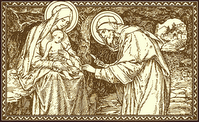 However, once the Church decided that the birth of Christ would be remembered on 25 December, the date certainly took on religious significance. The eighth day of Christmas falls on 1 January. Since Hebrew children were to be circumcised on their eighth day, we commemorate the Circumcision and Name of Jesus (see Luke 2:21). The naming is important because He received the “Name that is above every name, (Philippians 2:9)” the name that was also His “job description,” since Jesus means “He saves.”
However, once the Church decided that the birth of Christ would be remembered on 25 December, the date certainly took on religious significance. The eighth day of Christmas falls on 1 January. Since Hebrew children were to be circumcised on their eighth day, we commemorate the Circumcision and Name of Jesus (see Luke 2:21). The naming is important because He received the “Name that is above every name, (Philippians 2:9)” the name that was also His “job description,” since Jesus means “He saves.”

